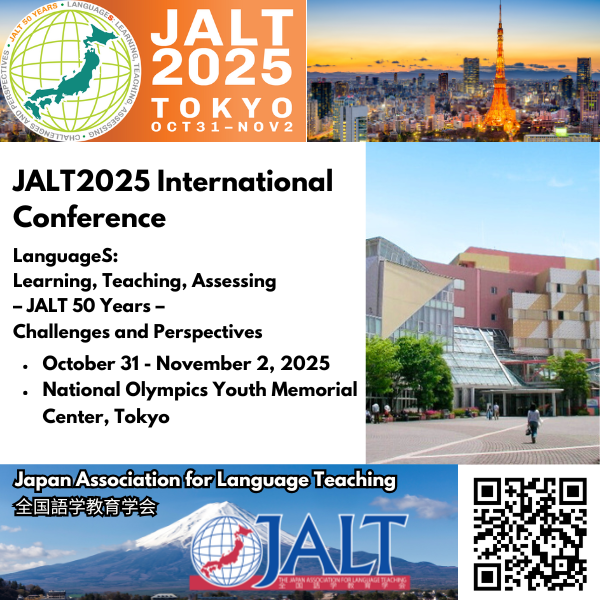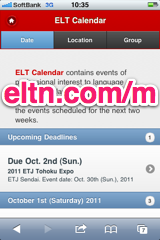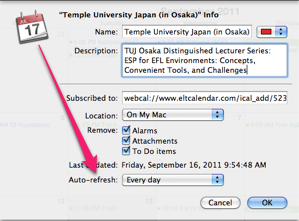ACTJ:
Harvesting Ideas: A Mini-conference for Canadian Educators and Friends
Date: Thursday, September 23rd, 2004 Time: 9:20 AM - 1:30 PM
Speaker: various speakers
Description:
Note that this mini-conference is being held on the Japanese national holiday of Shuubun-no-hi, the Autumnal Equinox. To preregister please contact Michael Dancsok (dunchoke@hotmail.com) with your name in the message box.
There will be four sessions with three presentations in each session. Because of the length of the conference ACTJ asks that you bring a sandwich or bento for the final session. There will also be a Materials Table of books published by ACTJ members. Complementary coffee provided by the embassy will be offered between the first and second session.
Site A
- 9:30-10:45 Andrew Reimann, Utsunomiya University and Robert McLaughlin, Tohoku Gakuen University. Cultural Orientations and Communication Styles; Implications for Vocabulary Acquisition
Andrew and Robert will identify and describe learner�s cultural orientations and consequent communication styles. Considering learning and communication strategies, an example of the practical application of loan words as a viable resource will be explored. - 10:30-11:15 Scott Bronner, Sophia University. Cross-Cultural Cinema Connections
Scott will offer ideas from his experience teaching intercultural identity courses as well as from an excellent Internet site with ready made questions for a number of excellent films for exploring cross-cultural issues. - 11:30-12:15 Neil Hefferman, Ritsumeikan University. Bringing Canada to the Classroom
Neil will present a lesson plan that introduces Canada to Japanese students. - 12:30-1:15 Forrest M. Nelson, Aoyama University. Translation Software and Plagiarism
Forrest will address plagiarism and the improper use of translation software by students followed by a discussion on how to detect the two. Finally, he will discuss solutions that can discourage students from plagiarizing and using translation software.
- 9:30-10:45 James McCrostie, Kanda University. Less Than the Sum of the Parts: In Investigation of Student Vocabulary
James will address a gap in vocabulary research by analyzing the notebooks kept by university level EFLlearners. The research provides teachers with new information about vocabulary notebooks and how standard strategies do not always meet studentsvocabulary learning needs. - 10:30-11:15 Mitsuko Matsuo, Senzo Gakuen College of Music. Storytelling Using Kamishibai
Mitsuko will show how using the traditional storytelling method of Kamishibai students can learn to create stories in English. Students will be present to demonstrate this story telling method. - 11:30-12:15 Keta Kikuchi, Nihon University and Matthew Apple, Himeji Dokkyo University. Listening to learners: Needs analysis in an EFL classroom
This presentation shows what classroom teachers can do to conduct needs analysis in their own classrooms. - 12:30-1:15 Kevin Watson, Tokushima Arts and Science University. Active Teaching/Communication Module for High School and Junior High School Teachers
Kevin will give a 'hands on' presentation of a module for high school and junior high school teachers teaching oral communication.
- 9:30-10:15 Marlene Ernst, Aoyama University, IJU and Joseph Dias, Aoyama University. And Now a Word from our Students
Marlene and Joseph will introduce some materials using international ads as sources for learning Englishand give suggestions on what can be done with them in the classroom they will also present video and print public service announcements and spoof ads created by our students. - 10:30-11:15 Alastair Graham-Marr, ABAX ELT Publishers. Teaching Listening to Low-level Learners
Alistair will discuss the difference between bottom-up skills and top-bottom skills and how each influence the efficiency of the learners ability to learn a language. - 11:30-12:15 David McMurray, International University of Kagoshima. Haiku Composed in English as a Japanese Language
Editor of Asahi Haikuist Network in the Asahi Shinbun, David will discuss the use of haiku as an educuational and cultural tool. Participants are asked to be prepared to make a haiku using the word kigo (harvest). - 12:30-1:15 Hillel Wright, Tokyo Keizai University. Using Short Fiction and Poetry in English Classes
Hillel will discuss his use of these forms of English as a means to enhance interest and English language ability in the language learner.
Organization: The Association of Canadian Teachers in Japan (ACTJ)
Cost: 500 yen
Venue: 4th floor of the Embassy of Canada: 3-38, Akasaka 7-chome, Minato-ku, Tokyo
Location: Tokyo, Tokyo Metropolis, Japan
![]() Add this to iCal
Add this to iCal
![]() (Need help?)
(Need help?)
![]() Add to Outlook
Add to Outlook
![]() (Need help?)
(Need help?)








